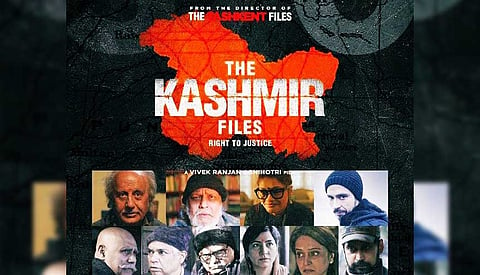

Cast: Anupam Kher, Mithun Chakraborty, Darshan Kumaar, Pallavi Joshi, Chinmay Mandelkar, Bhasha Sumbli, Puneet Issar, Mrinal Kulkarni, Prakash Belawadi, Atul Srivastava
Director: Vivek Ranjan Agnihotri
Social media is divided; social media is on fire! Beyond all the controversies, it is therefore safe to say that just within a week of its release 'The Kashmir Files' has captivated audiences the world over to create a strong impact.
The politics of it all aside, this review digs into the film’s creative merits.
MORE LIKE THIS…
At the very outset, the film catches the bull by its horn to train its lens on the treatment of Kashmir’s Hindu population in the 1980s.
Parallels are drawn with the genocide of the Jews under Nazi Germany, with the implication that it is about time that Hindus from the conflict-torn region speak out about their forced exit – which the film boldly declares was genocide.
The Jammu camp of the film is likened to the concentration camps from holocaust movies. The tagging and shooting of Kashmiri Pandits in a queue, as depicted, is a clear message that these targeted killings in Kashmir were no different to similar persecutions in other parts of the world. Rows of dead bodies hanging from trees in the moonlight is one of the many scenes that will haunt you long after the credits have rolled.
MORE LIKE THIS…
Slogans like a Kashmiri kid chanting 'Al Safa, Hindu Dafa' (annihilation of Kashmiri Hindus) or 'Raliv, Galiv ya Chaliv' (convert, die or flee) will also linger on in memory.
The stellar performance of Anupam Kher as Pushkar Nath Pandit, representative of the 2 per cent “minority amongst minorities” may very well become a key reason to watch the film over again. His portrayal of a non-violent Kashmiri Pandit, helpless in the face of the inhumane treatment by the state and terrorists alike is breath-takingly spot on.
Separatist leader Bitta Karate's character (Mandelkar) sends shivers as he unflinchingly acknowledges the killing of 25 Kashmiri Pandits singlehandedly on national television.
MORE LIKE THIS…
Many of the scenes that will make one think and rethink are adapted from true incidents. And so are many of the complex characters, such as Professor Radhika Menon (Joshi), reminiscent of real-life academics and authors.
Heart-wrenching scenes like the shooting of Pushkar Pandit's (Kher) son while he was hiding in a rice drum, force feeding his daughter-in-law Sharda (Shumbli) the blood-soaked rice, and later stripping her in public followed by her brutal killing and more such hard-hitting scenes add to the sheer intensity of the narrative.
I came out strongly feeling that we must all watch this film to witness the atrocities that humans are capable of perpetrating on other humans in the name of Azadi (freedom).
The lyrics and picturisation of the song 'Hum Dekhenge' with smiling youths singing to drum beats has a poignant message. The tragic irony of killing innocent women and children while chanting azadi is clearly lost on them.
By the time Pushkar declares on screen that azadi means death and politics is nothing but mass killing, the audience are primed to echo those words.
MORE LIKE THIS…
With such a heavy subject matter and the clearly evident research that has been poured in, ‘The Kashmir Files’ had the potential of becoming a cinematic masterpiece of global standards had it not been for some glaring missed opportunities.
It is said that a storyteller can't narrate his story effectively unless he is emotionally detached from it. That is where this film seems to flounder in its storytelling. It makes one wonder whether there weren’t any moderate or good-natured non-Hindus living in those dark times in Kashmir?
While watching, it feels a bit odd that almost all the characters are named after Hindu gods and goddesses, except the terrorists of course. Also, the protagonist Krishna Pandit's (Darshan Kumar) character could have been more fleshed out, as a lack of authenticity failed to connect with the audience. Kumar's acting and mannerism strongly reminded me of Robert Downey Jr, particularly in his climactic speech.
Besides, the second half loses the tight-knit tension with which things started out, making it seem like a dialogue-heavy drag towards the end. I was left feeling that the film could have been rounded off much better.
Overall, a hard laboured effort that will no doubt continue to make headlines for myriad reasons.